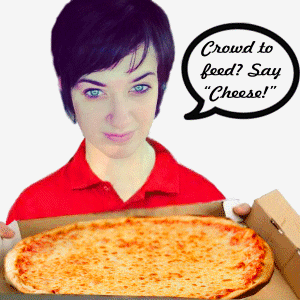|
The Pizza Effect, And Why Crowds Are Stupid
by Charles Carreon
July 23, 2013

Ann Bransom, As Smart As Many, by
Tara Carreon
[Ann Bransom] Crowd to feed? Say “Cheese!”
I was twelve when I realized I liked anchovies on my pizza.
Shortly thereafter, I realized that hardly anyone else did.
Since I would rarely buy myself a whole pizza, and there was
no pizza-by-the-slice in the Phoenix, Arizona of my youth, I
resigned myself to anchovy-less pizzas until I became more
independent. Then I had kids, and they didn’t like
anchovies, either.
I just can’t get around the Pizza Effect: The larger
the number of people ordering pizza, the more likely you
will get plain cheese. If you are among
meat-eaters, you have good odds of getting pepperoni, or a
half-pepperoni. But even splitting the pizza toppings down
the middle will not get you anchovies in any group of more
than two — anchovy-haters are just too prevalent.
The Pizza Effect is a particular application of the more
general rule that accounts for the stupidity of crowds, the
Law of Selective Aggregation: “Whenever things get massed
together, some of their properties aggregate,
and other properties do not.” For example, a pile of carbon
atoms, exists as “carbon” only because the strong nuclear
force binds the subatomic particles of the nucleus together
and keeps the electrons within their shells. But in a ton
of coal the strong nuclear force does not aggregate. Only
the gravitic force of the coal atoms aggregates; wherefore,
it weighs a ton.
A crowd of people aggregates the physical
strength and the
emotion of
the crowd. That is why provoking a deadly stampede is very
easy, and there is a rule against shouting “fire” in a
crowded theatre. Tug-of-war is a game built around
aggregating physical strength. Add more people, and you can
pull harder. Emotion also aggregates, perhaps because
emotion is transmitted through simple words and gestures
that work powerfully in mass communication, perhaps for
deeper reasons. The power of aggregate emotion is easily
recollected. You brush it off if one person in a movie
audience says, “Sit down!” But if the whole row of people
says it, you may feel humiliated and be unable to enjoy the
movie. The massed emotional disapproval is more painful and
intimidating.
By contrast, even though a good communicator may educate a
crowd, he or she cannot aggregate the intelligence of its
members to increase the speed with which we can solve a
computational problem. For example, if we projected the
following question on the screen at a moviehouse: “What is
the square root of 67?” The quickest answer will come no
faster than the most mathematically adept person in the
crowd can provide it. Cognitive processes like computation
and other intellectual skills like rational problem solving
do not aggregate in a crowd.
In Brave
New World Revisited, Aldous Huxley takes it further, and
effectively argues that in crowds, all negative human
qualities aggregate, such that people packed in crowds
suffer “herd-poisoning.” He discusses this subject in the
context of analyzing the art of demagoguery. Huxley turns
to Adolph Hitler for a case study, because Hitler knew
“crowds and propaganda” “by firsthand experience.” To make
the German populace “more masslike, more homogeneously
subhuman, he assembled them by the thousands and the tens of
thousands, in vast halls and arenas, where individuals would
lose their personal identity, even their elementary
humanity, and be merged with the crowd.” Because “a crowd
is chaotic, has no purpose of its own and is capable of
anything except intelligent action and realistic thinking,”
people in a crowd suffer from “herd-poisoning,” an
“intoxication” in which the “crowd-intoxicated individual
escapes from responsibility, intelligence and morality into
a kind of frantic, animal mindlessness.”
Whether it’s that bad or not, I don’t know. But at minimum,
I know this — in a crowd, feeling what everyone else is
feeling, you have the same intelligence as the whole crowd.
You are likely much more stupid than usual. You are more
likely to get a tattoo, make an inappropriate comment,
inflict unwanted contact on someone of the opposite sex, or,
in the really wrong crowd, discover yourself “hating” people
you don’t even know, burning to punish them for wrongs that
“everybody knows” they committed. That’s called a lynching,
and it’s the apex of stupidity. Most people wouldn’t lynch
anybody as a solo project, because then everyone would stop
liking them for being a homicidal maniac. But crowds do
lynch people –- time and again. Because, to a crowd, the
worst ideas sound like the best ones.
|